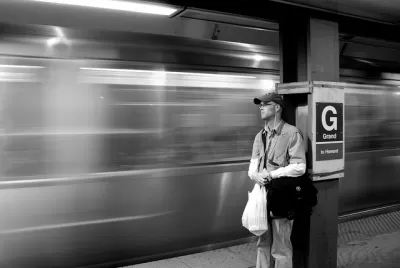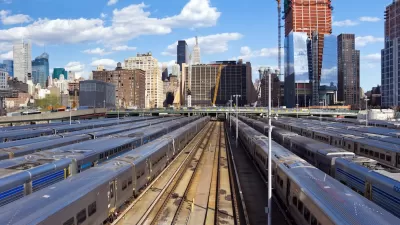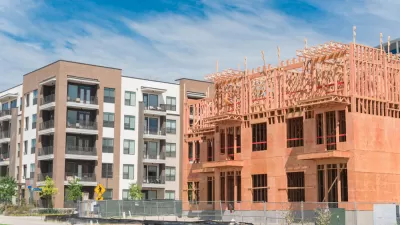The city of Chicago is focusing its development incentives around transit stations, but the people moving into those neighborhoods tend to be wealthier than previous residents.

"Some Logan Square residents are worried that new high-end apartments being built under a city ordinance aimed at promoting development near transit may be accelerating gentrification and pushing lower-income people farther away from the trains," according to an article by Mary Wisniewski.
According to the narrative arc of the article, Chicago is failing to live up the example in transit oriented development set by cities like New York, Philadelphia, Boston and San Francisco. "The Chicago area, meanwhile, saw a decline in development near transit relative to growth in the larger region, the study found." Further limiting the potential of the city's new transit oriented development to be a source of social equity is the growing affluence of new transit area residents as new projects come online. "[The] average household income in transit zones increased by 27 percent from 2000 to 2010," according to Wisniewski.
The article also allows Yonah Freemark to explain how new developments in the area of transit tends to be more expensive because they are new, also arguing that displacement might have been much worse if not for the new development. Freemark is quoted directly: "Displacement occurs more often when there's no construction at all — if you don't build new housing, all the wealthy people will move into existing housing stock….That's what we saw in Wicker Park and Lincoln Park."
The city of Chicago has thrown a fair amount of policy resources at transit oriented development (TOD) in recent years. The city expanded its TOD Ordinance in September 2015, and the Metropolitan Planning Council released a new "TOD Calculator" earlier this year.
FULL STORY: New buildings near 'L' mostly aimed at well-to-do

Alabama: Trump Terminates Settlements for Black Communities Harmed By Raw Sewage
Trump deemed the landmark civil rights agreement “illegal DEI and environmental justice policy.”

Study: Maui’s Plan to Convert Vacation Rentals to Long-Term Housing Could Cause Nearly $1 Billion Economic Loss
The plan would reduce visitor accommodation by 25% resulting in 1,900 jobs lost.

Planetizen Federal Action Tracker
A weekly monitor of how Trump’s orders and actions are impacting planners and planning in America.

Waymo Gets Permission to Map SF’s Market Street
If allowed to operate on the traffic-restricted street, Waymo’s autonomous taxis would have a leg up over ride-hailing competitors — and counter the city’s efforts to grow bike and pedestrian on the thoroughfare.

Parklet Symposium Highlights the Success of Shared Spaces
Parklets got a boost during the Covid-19 pandemic, when the concept was translated to outdoor dining programs that offered restaurants a lifeline during the shutdown.

Federal Homelessness Agency Places Entire Staff on Leave
The U.S. Interagency Council on Homelessness is the only federal agency dedicated to preventing and ending homelessness.
Urban Design for Planners 1: Software Tools
This six-course series explores essential urban design concepts using open source software and equips planners with the tools they need to participate fully in the urban design process.
Planning for Universal Design
Learn the tools for implementing Universal Design in planning regulations.
Caltrans
Smith Gee Studio
Institute for Housing and Urban Development Studies (IHS)
City of Grandview
Harvard GSD Executive Education
Toledo-Lucas County Plan Commissions
Salt Lake City
NYU Wagner Graduate School of Public Service





























